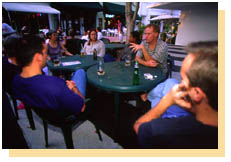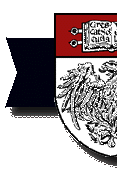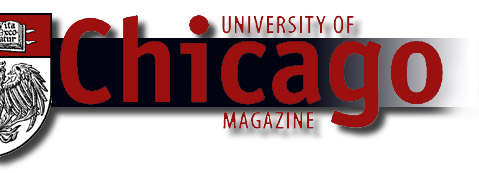 |

That was in
December. By March, he’d learned that the Guggenheim Foundation
agreed: He needed time to write. McGrath will spread the yearlong
fellowship across two years, skipping his fall teaching this year
and next to work on his nascent book, tentatively titled Florida
Poems (previews are forthcoming in the chapbook Mangrovia).
Meanwhile, he’s just completed a book of prose poems, Road Atlas,
due next spring from Ecco Press.
Like Spring
Comes to Chicago and McGrath’s earlier books, Capitalism
(Wesleyan University Press, 1990) and American Noise (Ecco
Press, 1993), Road Atlas and the Florida poems continue to
focus on America’s social and natural landscapes. They also extend
the autobiographical “thread” that weaves through all of McGrath’s
work. His first book, Capitalism, based on his M.F.A. poetry
portfolio at Columbia University, was completed in 1988, when McGrath
was 26. Even the admiring critics called the collection “a young
man’s book,” and McGrath unapologetically concedes the point. “That’s
who wrote it,” he says. “It’s very much about the concerns of a
25-year-old guy in America, doing his thing. It’s a matter of really
writing about what you care about and know about, and that changes
as your life changes.”
Born
at the University’s Lying-in Hospital in 1962, when his father,
a psychoanalyst, was finishing his medical degree at the U of C,
McGrath grew up in Washington, D.C., and attended Sidwell Friends
School. The Miami New Times described the high-school McGrath
as neither jock nor nerd, with like-minded friends who “would do
things like get drunk before debates and win anyway.” In the article,
a former classmate recalled McGrath as “an intellectual wild man.”
 “I was always smart,” McGrath reflects, “but I wasn’t always wise.
I didn’t know what to do with my intelligence.” He describes himself
in his first two years at the U of C as “ironic and smartass,” adding,
“It was very useful to me to learn about a more important level
of thinking.”
“I was always smart,” McGrath reflects, “but I wasn’t always wise.
I didn’t know what to do with my intelligence.” He describes himself
in his first two years at the U of C as “ironic and smartass,” adding,
“It was very useful to me to learn about a more important level
of thinking.”
McGrath is
matter-of-fact about the path that led him to a career in poetry.
“It starts in around the fifth grade,” he says. “You just keep picking
the creative option, writing the story instead of the book report.
Next thing you know, it’s 25 years later, and you’re still taking
the creative option. That’s kind of how my life has happened.”
At the College,
McGrath worked on the Chicago Literary Review, becoming editor
in his fourth year. He also played the stand-up snare drum in a
band of “punk-rock minimalists”; wrote and (with now-wife Elizabeth
R. Lichtenstein, AB’84) codirected a play for University Theater;
and won honors as a student in English language and literature.
True to form, he chose the creative option for his B.A. thesis,
submitting a poetry portfolio that won him the English department’s
Napier Wilt Award, given annually for the year’s best bachelor’s
project.
McGrath and
Lichtenstein, whose parents also met as students in the College,
still feel “this very mystical attachment” to Chicago and the University,
McGrath says. “Significant events keep circling around the U of
C.” It even played a part in the development of the central poem
of Spring Comes to Chicago. When McGrath returned to campus
as a visiting poet in 1991, “‘The Bob Hope Poem’ was definitely
being conceived,” he says. “It was me getting back to my Chicago,
U of C mind-set from my more pop-culture mind-set.”
|



